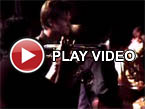Swans, "Soundtracks for the Blind"
 I first heard Swans in 1997 when I bought Soundtracks for the Blind in a downtown Portland record store. I picked the album on the strength of the title, but mostly because it was erroneously filed in the "Gothic" section. Immediately after buying it, I went with my father on a trip to Central Oregon. I vividly remember looking out at the blasted volcanic desert along Highway 97 to the accompaniment of the noxious, churning guitar noise of "The Sound". At the time, I had no idea that Swans were braking up or that they had been playing music for as long I had been alive.
I first heard Swans in 1997 when I bought Soundtracks for the Blind in a downtown Portland record store. I picked the album on the strength of the title, but mostly because it was erroneously filed in the "Gothic" section. Immediately after buying it, I went with my father on a trip to Central Oregon. I vividly remember looking out at the blasted volcanic desert along Highway 97 to the accompaniment of the noxious, churning guitar noise of "The Sound". At the time, I had no idea that Swans were braking up or that they had been playing music for as long I had been alive.
Listening to the album now, it’s somewhat difficult to imagine that Michael Gira thought the band was finished creatively. At more than two hours long, Soundtracks contains more worthwhile material than many musicians complete during their entire career. The album’s long format mirrors the demanding nature of the band.From their inception, Swans always worked on a large scale. Everything from extreme performance volumes to themes of birth, death, and annihilation reflected a driving need to make grandiose statements, so it follows that Swans wouldn’t skimp on their (would be) final effort.
For its monumental running time and weighty lyrics, Soundtracks goes by with surprising ease, due to the incredible diversity of sounds song structures. The album is a kind of giant collage of found sounds, home-recordings, live takes, and studio tracks. Often a single song will incorporate two or more of those elements, a departure from the regimented performances and pristine fidelity on previous records.
The spoken interludes between proper songs are among the most evocative moments of the album. Gira included a conversation from his father talking about his advancing blindness, while Jarboe supplied surveillance tapes made by her father, an ex-FBI agent. Some of these recordings have a quality altogether absent from previous records: levity. In "I Was a Prisoner of Your Skull," a voice rambles in a drunken southern drawl, "You was going to cook you some breakfast…Everything was fine, but you had to call me in there and show you how to use a fork." Out of context, that kind of monologue would sound downright stupid, but the accompaniment of loopy whistling and airy keyboard turns the banality into a kind of comic disease.
Another variation is the de-emphasis of Gira and Jarboe’s voices. Often, they are sublimated in audio-effects or cut up into loops. Listening to album for the first time, I got the impression that Swans were primarily an instrumental band, which was foolish considering that Soundtracks includes some of the band’s most potent lyrics.The song "All Lined Up" isn’t dark and brooding, it’s genocidal. "I see their bodies in the pyre…and taste the smoke of burning hair," Gira sings blithely, his words belying the perception that the singer had mellowed with age.
The album’s expansive structure also fails to blunt the instrumental fury of the band. The epic sprawl of "The Sound" with its crashing cymbals and leaden chords reveals the band’s debt to artists like Glen Branca and others in the Downtown New York music scene of the early 1980s. The live track, "Yab-Yum Killers," features the band in an abnormally loose mood with Jarboe’s shrieks recalling No-Wave singers such as Lucy Hamilton and Lydia Lunch, another reflection of the band’s early history.
Soundtracks for the Blind is in many respects a rare record. For such a gigantic, sprawling work, the lack of filler is near miraculous. If anything, Swans were, and are, a disciplined band. Regardless of any stylistic vice they have, everything they released sounds like a supreme effort. That trait is what keeps Soundtracks from becoming half-baked or bloated. By 1997, Swans had rich and long enough history to make a vast album which could incorporate everything that made them great. In that light, Gira calling quits seems like more of a triumph than a defeat, a stubborn demand to end things on his terms. That conviction is what sustained the band’s following thereafter, especially for fans like me who never got to see them live. Now that Swans have reformed, Soundtracks for the Blind is no longer the band’s final statement. Nonetheless, it remains a crucial one.
samples:




